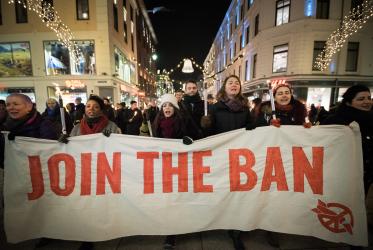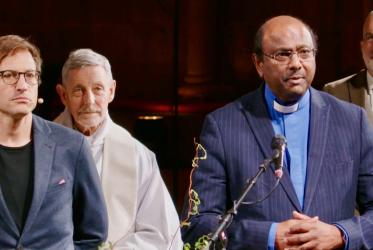The World Council of Churches (WCC) congratulated its partner, the International Campaign to Abolish Nuclear Weapons (ICAN), for receiving the Nobel Peace Prize on 6 October.
The Nobel Peace Prize 2017 was awarded to ICAN "for its work to draw attention to the catastrophic humanitarian consequences of any use of nuclear weapons and for its ground-breaking efforts to achieve a treaty-based prohibition of such weapons,” according to the Nobel committee.
At a press conference at the Ecumenical Centre, ICAN executive director Beatrice Fihn said the award came as a surprise - but a welcome and affirming one.
“We have great hopes and we will spare no effort to make an impact,” said Fihn. “This prize really awards the entire campaign, all the organizations who have worked tirelessly around the world, inspiring a new generation who grew up after the Cold War to rethink how we see these weapons.”
She thanked the WCC and ICAN’s other partners who have worked for years toward the Treaty on the Prohibition of Nuclear Weapons, adopted by 122 governments on 7 July. The treaty bans the manufacture, possession and use of nuclear weapons and provides pathways for their eventual elimination.
“Disarmament is a humanitarian imperative,” added Fihn. “We do not have to just accept nuclear weapons. We can change things.”
The Nobel Peace Prize awarded to ICAN is “a sign of hope and encouragement on the path to peace”, said WCC general secretary Rev. Dr Olav Fykse Tveit.
The WCC 2014 “Statement towards a Nuclear-free World” says that nuclear weapons cannot indeed be reconciled with real peace. “They inflict unspeakable suffering with blast, heat and radiation,” the statement reads. “As long as nuclear weapons exist, they pose a threat to humanity.”
Tveit said “For the WCC, this is a major landmark on the long path since the 1983 WCC Assembly denounced the production, deployment and use of nuclear weapons as a crime against humanity. Our moral imperative against nuclear weapons is clear and categorical.
We can all urge our governments to sign and ratify the treaty and then to see that it is implemented.”
Tveit added in this critical times “In the context of the Korean peninsula, the threat of nuclear conflict jeopardizes the lives and future not only of the people of the peninsula but of the wider region and the globe.”
“The World Council of Churches reaffirms its commitment to advance the campaign for the abolition and elimination of nuclear weapons, and to encouraging and supporting churches across the world in their work for sustainable peace and justice in a world without nuclear weapons,” concluded Tveit.
Related links:
WCC work on nuclear arms control
Banning nuclear weapons, 122 governments take leadership where nuclear powers have failed (WCC press release, 8 July 2017)
WCC Statement towards a Nuclear-free World
Download the ICAN statement on receiving the Nobel Peace Prize







